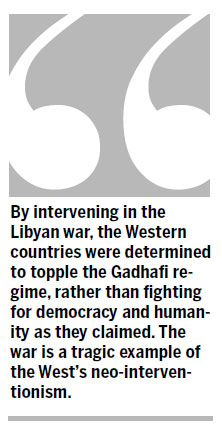Libyan model is dangerous game
Updated: 2012-03-17 07:59
By Wang Lincong (China Daily)
|
||||||||

Western overthrow of Gadhafi caused further bloodshed and wider divisions, Syria should not suffer the same fate
That Libya's eastern region of Cyrenaica declared its "semi-autonomy" from the central government on March 6 is a huge threat to Libya's unity and sovereign integrity, as well as a direct challenge to the authority of the National Transitional Council. It reflects the tremendous risks facing the Libyan government as it struggles with reconstruction and the political transition after the downfall of the Muammar Gadhafi government.
Deep-rooted internal tensions have become increasingly prominent in the country since NATO's military intervention engineered the downfall of the Gadhafi regime. When Gadhafi was killed, the political integration launched by him was brought to a stop. It is just over 50 years since the creation of a single Libyan state, on Dec 24, 1951 as the United Kingdom of Libya, comprised of the three provinces of Tripolitania, Cyrenaica, and Fezzan. Rebuilding Libya will be much more difficult than overthrowing the Gadhafi regime.
Gadhafi's long-term rule, and the uneven distribution of oil wealth exacerbated regional imbalances and the polarization between the rich and the poor, resulting in unemployment of more than 30 percent in the oil-rich country. It was this wealth gap which finally sparked social unrest and the outbreak of civil war.
Rebuilding Libya depends on the recovery of the authority and the governance capability of the Libyan government, the rebuilding of a national identity, and the allegiance and support of local forces to the state.
However, members of the National Transitional Council come from different groups of the opposition with different internal positions and each of them does things in their own way. The council lacks charismatic figures and financial experts and, following Gadhafi's demise, the scramble for power and wealth has brought conflicts within the council into the open and divided the newborn regime. Libya is a tribal society with people loyal more to their tribes than to the state. Tribal interests and tribal consciousness have a direct bearing on people's sense of a national identity.
In addition, the bloody clashes and indiscriminate reprisals have further exacerbated traditional hatreds and deepened the estrangement and rifts among different regions and tribes. Cyrenaica's declaration of "autonomy" could be a sign of Libya's pending dissolution.
The West's "Libya model" has not stood the test.
By intervening in the Libyan war, the Western countries were determined to topple the Gadhafi regime, rather than fighting for democracy and humanity as they claimed. The war is a tragic example of the West's neo-interventionism.
In the first decade of the 21st century Western countries hastily invaded Iraq under the guise of "democratic reform" and ultimately left the Iraqi people with untold sufferings. In the second decade Western countries have created the "myth" of humanitarian intervention and taken advantage of the "Arab Spring" to engineer regime change in Libya, which has sowed the seeds of hatred.
Historically, when a "strongman regime" collapses, there is another strongman regime to replace it, or the country falls into anarchy.
To create a democratic regime through the "Libya model" is impossible. The promotion of democracy requires certain preconditions, which permit the people and the government to help each other advance.
More than half a year has passed since the Gadhafi regime collapsed and the ruling National Transitional Council has not achieved effective control of the country, which suggests that its authority has not been established. It is proving difficult to put an end to the new and old hatreds caused by the war. Fifty years ago, Libya was united as a single kingdom. Today, it is in danger of splitting apart.
At present, as the Syrian crisis deepens and bloody clashes intensify, the calls for intervention persist. The declaration of "autonomy" by Libya's eastern region should serve as a warning that to promote regime change through the "Libya model" is a dangerous game.
The author is a senior researcher of the Institute of West Asian and African Studies, Chinese Academy of Social Sciences.
(China Daily 03/17/2012 page5)

 Relief reaches isolated village
Relief reaches isolated village
 Rainfall poses new threats to quake-hit region
Rainfall poses new threats to quake-hit region
 Funerals begin for Boston bombing victims
Funerals begin for Boston bombing victims
 Quake takeaway from China's Air Force
Quake takeaway from China's Air Force
 Obama celebrates young inventors at science fair
Obama celebrates young inventors at science fair
 Earth Day marked around the world
Earth Day marked around the world
 Volunteer team helping students find sense of normalcy
Volunteer team helping students find sense of normalcy
 Ethnic groups quick to join rescue efforts
Ethnic groups quick to join rescue efforts
Most Viewed
Editor's Picks

|

|

|

|

|

|
Today's Top News
Health new priority for quake zone
Xi meets US top military officer
Japan's boats driven out of Diaoyu
China mulls online shopping legislation
Bird flu death toll rises to 22
Putin appoints new ambassador to China
Japanese ships blocked from Diaoyu Islands
Inspired by Guan, more Chinese pick up golf
US Weekly

|

|







